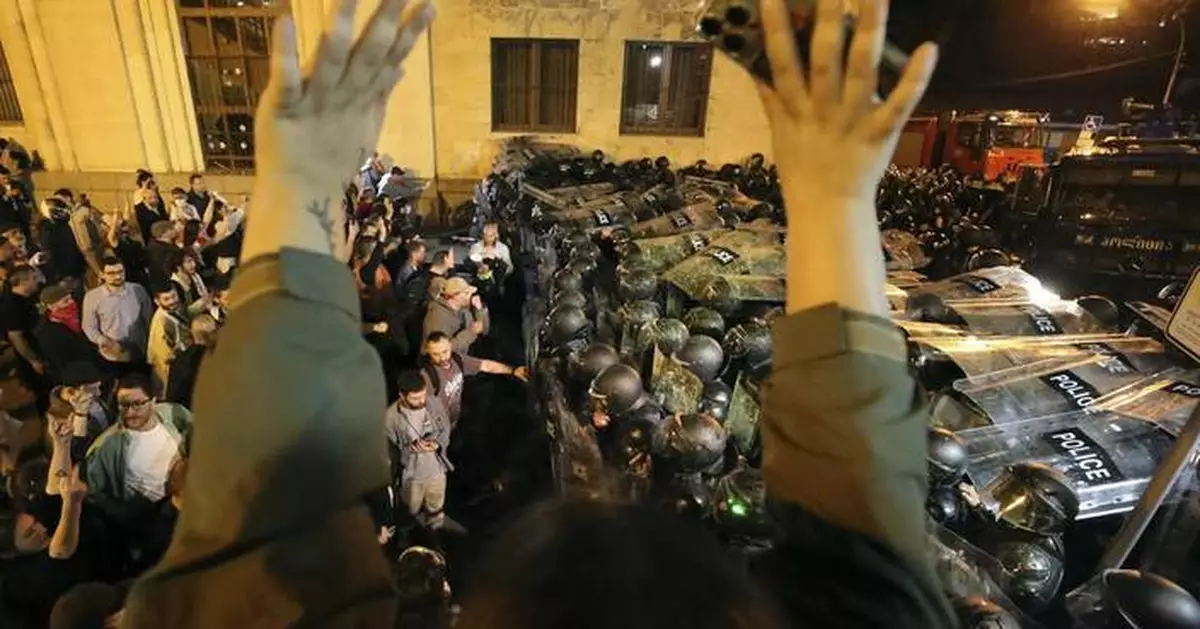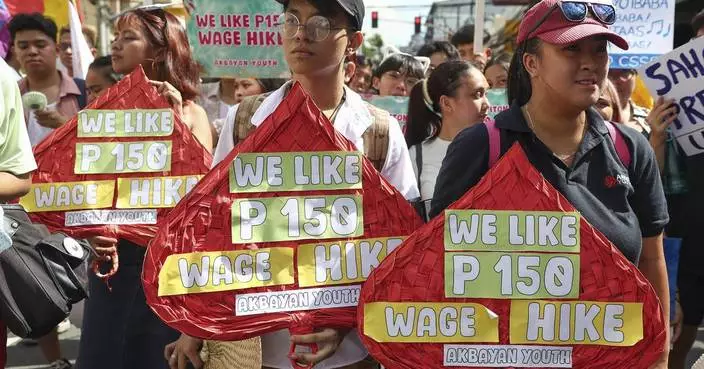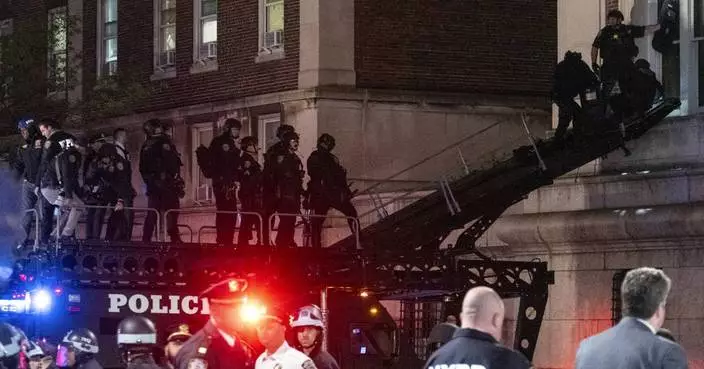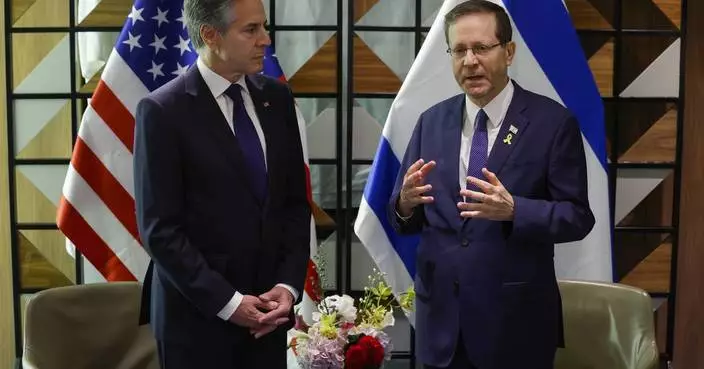TBILISI, Georgia (AP) — Georgia's parliament has voted in the first reading to approve a proposed law that would require media and non-commercial organizations to register as being under foreign influence if they receive more than 20% of their funding from abroad.
Thousands gathered outside parliament to protest. Opponents say the proposal would obstruct Georgia’s long-sought prospects of joining the European Union. They denounce it as “the Russian law” because Moscow uses similar legislation to stigmatize independent news media and organizations seen as being at odds with the Kremlin.
Click to Gallery
TBILISI, Georgia (AP) — Georgia's parliament has voted in the first reading to approve a proposed law that would require media and non-commercial organizations to register as being under foreign influence if they receive more than 20% of their funding from abroad.
A demonstrator waves Georgian national flags during a rally outside the parliament building in Tbilisi, Georgia, on Thursday, April 18, 2024, to protest against "the Russian law" similar to a law that Russia uses to stigmatize independent news media and organizations seen as being at odds with the Kremlin. (AP Photo/Zurab Tsertsvadze)
A demonstrator shouts during a rally outside the parliament building in Tbilisi, Georgia, on Thursday, April 18, 2024, to protest against "the Russian law" similar to a law that Russia uses to stigmatize independent news media and organizations seen as being at odds with the Kremlin. (AP Photo/Zurab Tsertsvadze)
A demonstrator holds a EU flag as other gather outside the parliament building in Tbilisi, Georgia, on Wednesday, April 17, 2024, to protest against "the Russian law" similar to a law that Russia uses to stigmatize independent news media and organizations seen as being at odds with the Kremlin. (AP Photo/Zurab Tsertsvadze)
Demonstrators wave Georgian and EU flags as they gather outside the parliament building in Tbilisi, Georgia, on Wednesday, April 17, 2024, to protest against "the Russian law" similar to a law that Russia uses to stigmatize independent news media and organizations seen as being at odds with the Kremlin. (AP Photo/Zurab Tsertsvadze)
Demonstrators wave Georgian and EU flags as they gather outside the parliament building in Tbilisi, Georgia, on Wednesday, April 17, 2024, to protest against "the Russian law" similar to a law that Russia uses to stigmatize independent news media and organizations seen as being at odds with the Kremlin. (AP Photo/Zurab Tsertsvadze)
Demonstrators gather outside the parliament building in Tbilisi, Georgia, on Wednesday, April 17, 2024, to protest against "the Russian law" similar to a law that Russia uses to stigmatize independent news media and organizations seen as being at odds with the Kremlin. (AP Photo/Zurab Tsertsvadze)
Police try to block demonstrators gathered outside the parliament building in Tbilisi, Georgia, on Thursday, April 18, 2024, to protest against "the Russian law" similar to a law that Russia uses to stigmatize independent news media and organizations seen as being at odds with the Kremlin. (AP Photo/Zurab Tsertsvadze)
Demonstrator shouts during a rally outside the parliament building in Tbilisi, Georgia, on Thursday, April 18, 2024, to protest against "the Russian law" similar to a law that Russia uses to stigmatize independent news media and organizations seen as being at odds with the Kremlin. (AP Photo/Zurab Tsertsvadze)
A demonstrator gestures as he shouts during a rally outside the parliament building in Tbilisi, Georgia, on Thursday, April 18, 2024, to protest against "the Russian law" similar to a law that Russia uses to stigmatize independent news media and organizations seen as being at odds with the Kremlin. (AP Photo/Zurab Tsertsvadze)
A demonstrator holds a Georgian national flag during a rally outside the parliament building in Tbilisi, Georgia, on Wednesday, April 17, 2024, to protest against "the Russian law" similar to a law that Russia uses to stigmatize independent news media and organizations seen as being at odds with the Kremlin. (AP Photo/Zurab Tsertsvadze)
People help an unconscious demonstrator during a rally outside the parliament building in Tbilisi, Georgia, on Thursday, April 18, 2024, to protest against "the Russian law" similar to a law that Russia uses to stigmatize independent news media and organizations seen as being at odds with the Kremlin. (AP Photo/Zurab Tsertsvadze)
Police try to block demonstrators gathered outside the parliament building in Tbilisi, Georgia, on Wednesday, April 17, 2024, to protest against "the Russian law" similar to a law that Russia uses to stigmatize independent news media and organizations seen as being at odds with the Kremlin. (AP Photo/Zurab Tsertsvadze)
Demonstrators react listening to a speaker as they gather outside the parliament building in Tbilisi, Georgia, on Wednesday, April 17, 2024, to protest against "the Russian law" similar to a law that Russia uses to stigmatize independent news media and organizations seen as being at odds with the Kremlin. (AP Photo/Zurab Tsertsvadze)
Demonstrators wave a Georgian national flag as they gather outside the parliament building in Tbilisi, Georgia, on Wednesday, April 17, 2024, to protest against "the Russian law" similar to a law that Russia uses to stigmatize independent news media and organizations seen as being at odds with the Kremlin. (AP Photo/Zurab Tsertsvadze)
Demonstrators, one of them waves a EU flag, gather outside the parliament building in Tbilisi, Georgia, on Wednesday, April 17, 2024, to protest against "the Russian law" similar to a law that Russia uses to stigmatize independent news media and organizations seen as being at odds with the Kremlin. (AP Photo/Zurab Tsertsvadze)
Demonstrators wave Georgian and EU flags as they gather outside the parliament building in Tbilisi, Georgia, on Wednesday, April 17, 2024, to protest against "the Russian law" similar to a law that Russia uses to stigmatize independent news media and organizations seen as being at odds with the Kremlin. (AP Photo/Zurab Tsertsvadze)
Demonstrators attend a rally outside the parliament building in Tbilisi, Georgia, on Wednesday, April 17, 2024, to protest against "the Russian law" similar to a law that Russia uses to stigmatize independent news media and organizations seen as being at odds with the Kremlin. (AP Photo/Zurab Tsertsvadze)
Demonstrators hold a Georgian national flag as they gather outside the parliament building in Tbilisi, Georgia, on Wednesday, April 17, 2024, to protest against "the Russian law" similar to a law that Russia uses to stigmatize independent news media and organizations seen as being at odds with the Kremlin. (AP Photo/Zurab Tsertsvadze)
Demonstrators wave Georgian and EU flags as they gather outside the parliament building in Tbilisi, Georgia, on Wednesday, April 17, 2024, to protest against "the Russian law" similar to a law that Russia uses to stigmatize independent news media and organizations seen as being at odds with the Kremlin. (AP Photo/Zurab Tsertsvadze)
Police block protestors gathered outside the parliament building in Tbilisi, Georgia, on Tuesday, April 16, 2024, to protest against "the Russian law" similar to a law that Russia uses to stigmatize independent news media and organizations seen as being at odds with the Kremlin. (AP Photo/Zurab Tsertsvadze)
“If it is adopted, it will bring Georgia in line with Russia, Kazakhstan and Belarus and those countries where human rights are trampled. It will destroy Georgia’s European path,” said Giorgi Rukhadze, founder of the Georgian Strategic Analysis Center.
In an online statement Wednesday, EU foreign policy chief Josep Borrell described the parliament’s move as “a very concerning development" and warned that “the final adoption of this legislation would negatively impact Georgia’s progress on its EU path."
"This law is not in line with EU core norms and values,” Borrell said.
Borrell said that “Georgia has a vibrant civil society” that is a key part of its EU membership quest.
“The proposed legislation would limit the capacity of civil society and media organizations to operate freely, could limit freedom of expression and unfairly stigmatize organizations that deliver benefits to the citizens of Georgia,” he added.
Although Georgian President Salome Zourabichvili would veto the law if it is passed by parliament in the third reading, the ruling party can override the veto by collecting 76 votes. Then the parliament speaker can sign it into law.
The bill is nearly identical to a proposal that the governing party was pressured to withdraw last year after large street protests. Police in the capital, Tbilisi, used tear gas Tuesday to break up a large demonstration outside the parliament.
Wednesday had an even larger rally. Speaking there, opposition parliament member Aleksandre Ellisashvili denounced lawmakers who voted for the bill as “traitors” and said the rest of Georgia will show them that "people are power, and not the traitor government.”
The only change in wording from the previous draft law says non-commercial organizations and news media that receive 20% or more of their funding from overseas would have to register as “pursuing the interests of a foreign power.” The previous draft law said “agents of foreign influence.”
Zaza Bibilashvili with the civil society group Chavchavadze Center called the vote on the law an “existential choice."
He suggested it would create an Iron Curtain between Georgia and the EU, calling it a way to keep Georgia “in the Russian sphere of influence and away from Europe.”
freedom of expression and unfairly stigmatize organizations that deliver benefits to the citizens of Georgia,” he added.
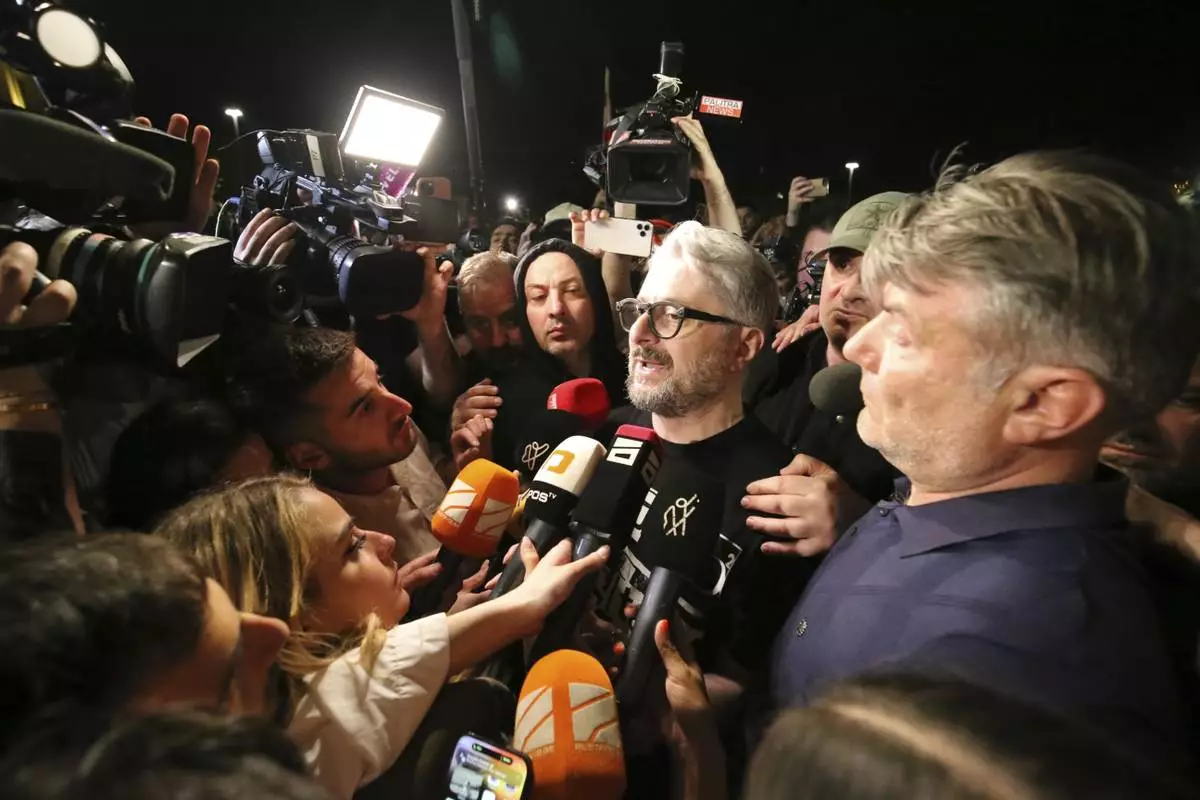
Nika Gvaramia, a Georgian politician and the founder of the Ahali party and Mtavari TV, one of the biggest TV media outlets in the country, speaks to journalists during a rally outside the parliament building in Tbilisi, Georgia, on Wednesday, April 17, 2024, to protest against "the Russian law" similar to a law that Russia uses to stigmatize independent news media and organizations seen as being at odds with the Kremlin. (AP Photo/Zurab Tsertsvadze)
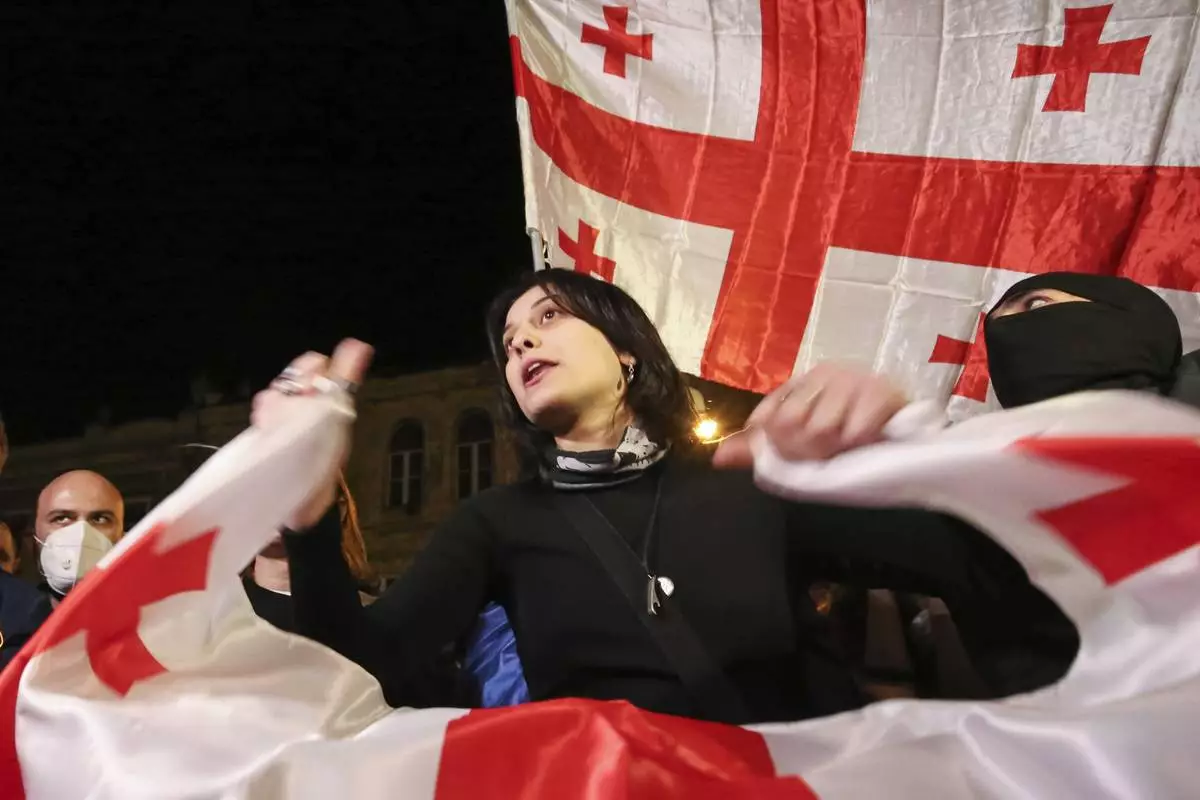
A demonstrator waves Georgian national flags during a rally outside the parliament building in Tbilisi, Georgia, on Thursday, April 18, 2024, to protest against "the Russian law" similar to a law that Russia uses to stigmatize independent news media and organizations seen as being at odds with the Kremlin. (AP Photo/Zurab Tsertsvadze)
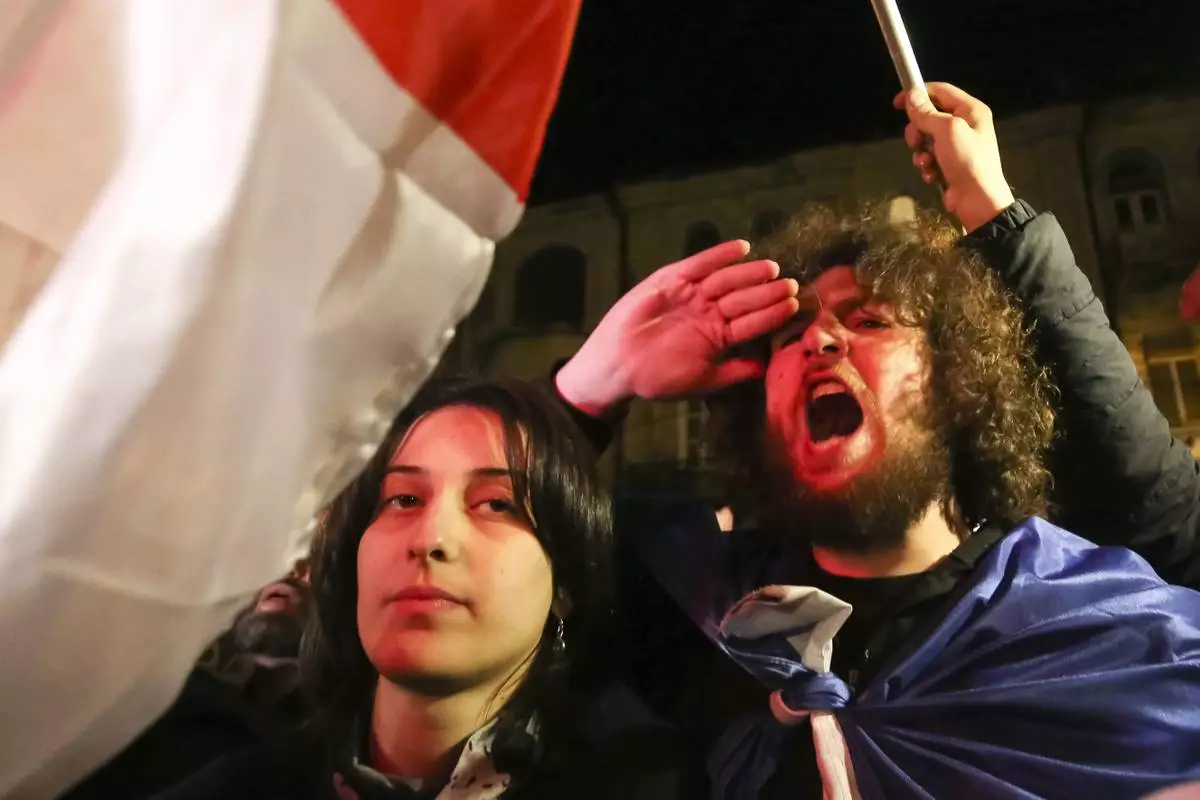
A demonstrator shouts during a rally outside the parliament building in Tbilisi, Georgia, on Thursday, April 18, 2024, to protest against "the Russian law" similar to a law that Russia uses to stigmatize independent news media and organizations seen as being at odds with the Kremlin. (AP Photo/Zurab Tsertsvadze)
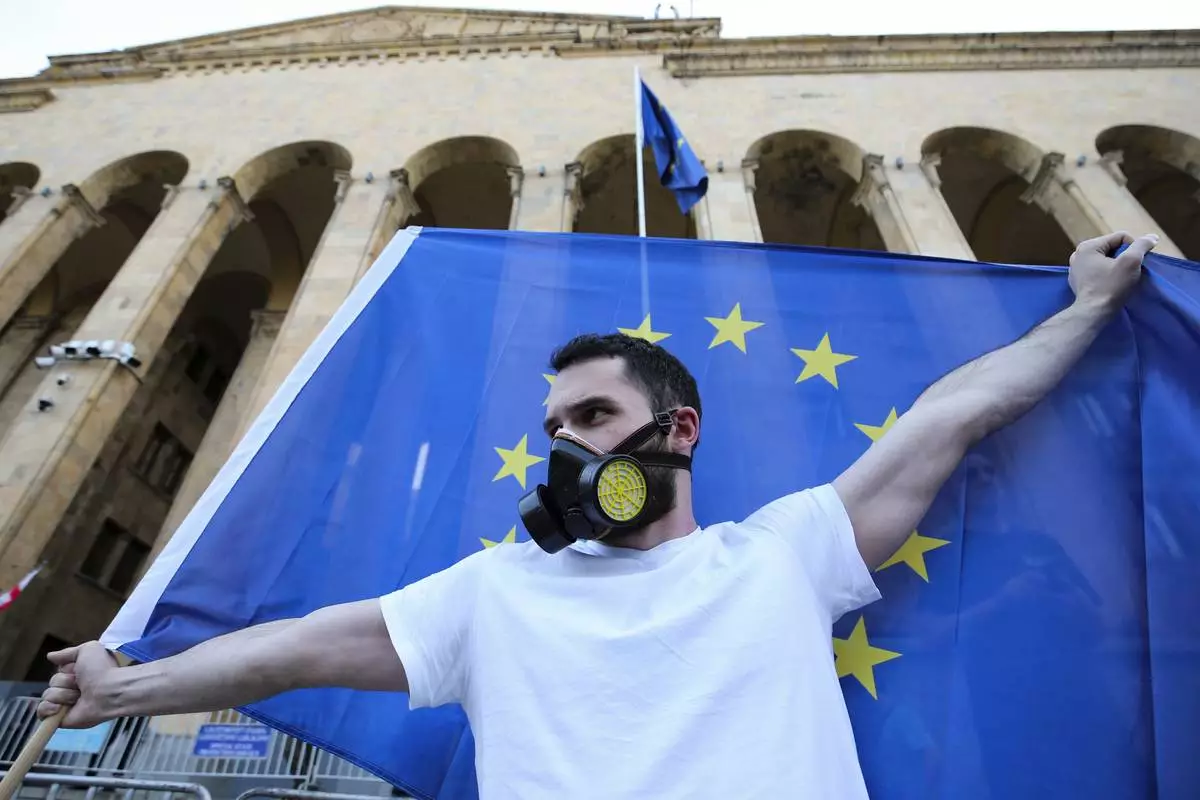
A demonstrator holds a EU flag as other gather outside the parliament building in Tbilisi, Georgia, on Wednesday, April 17, 2024, to protest against "the Russian law" similar to a law that Russia uses to stigmatize independent news media and organizations seen as being at odds with the Kremlin. (AP Photo/Zurab Tsertsvadze)
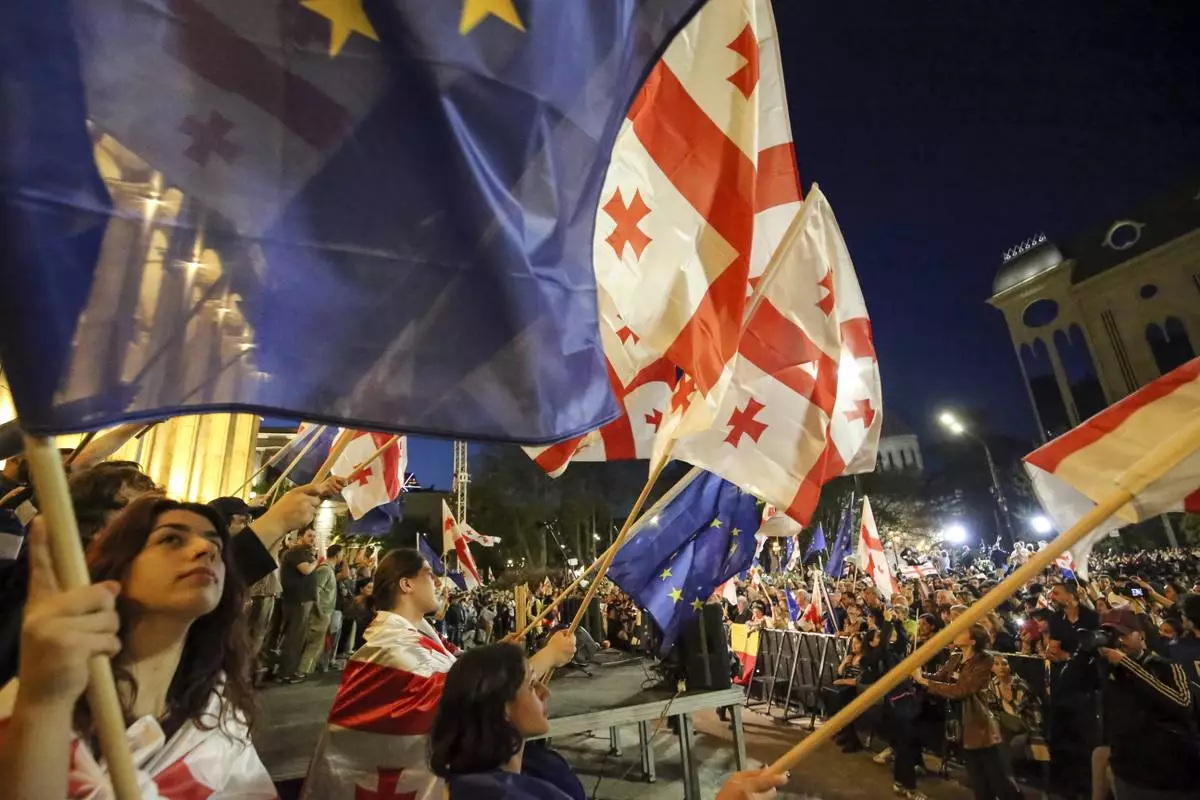
Demonstrators wave Georgian and EU flags as they gather outside the parliament building in Tbilisi, Georgia, on Wednesday, April 17, 2024, to protest against "the Russian law" similar to a law that Russia uses to stigmatize independent news media and organizations seen as being at odds with the Kremlin. (AP Photo/Zurab Tsertsvadze)
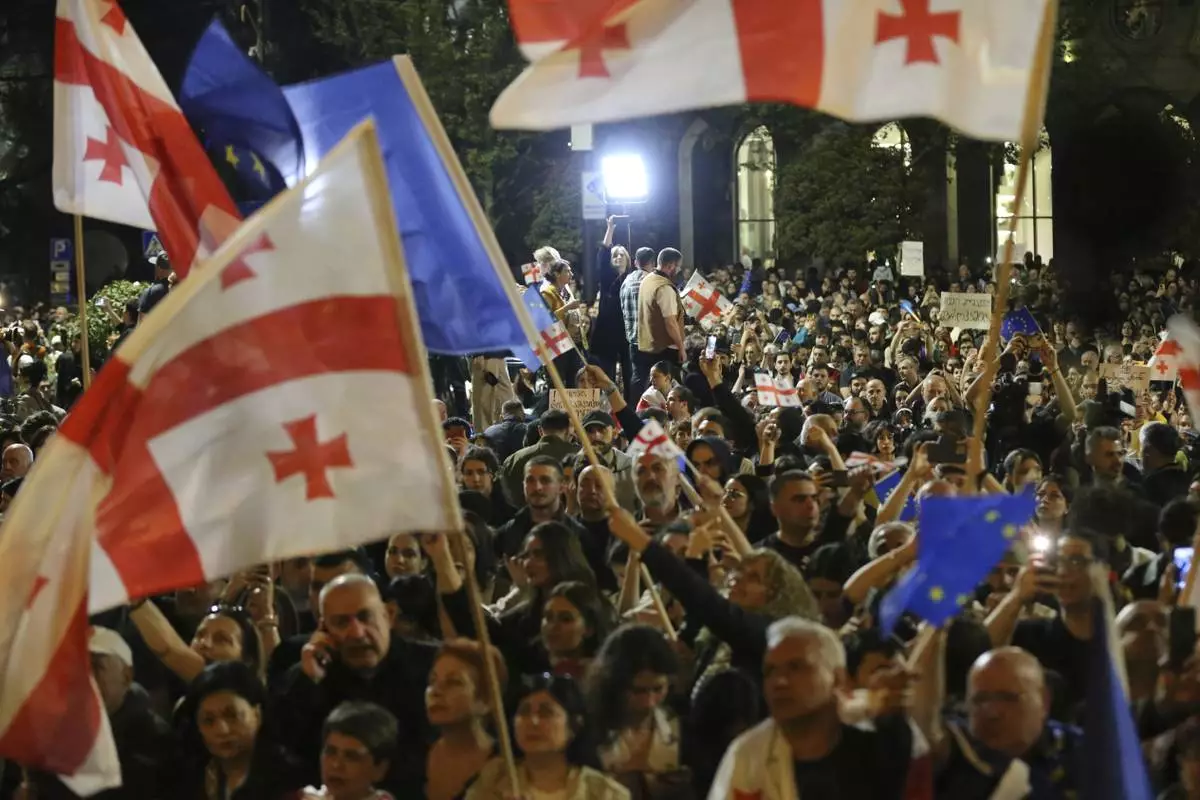
Demonstrators wave Georgian and EU flags as they gather outside the parliament building in Tbilisi, Georgia, on Wednesday, April 17, 2024, to protest against "the Russian law" similar to a law that Russia uses to stigmatize independent news media and organizations seen as being at odds with the Kremlin. (AP Photo/Zurab Tsertsvadze)
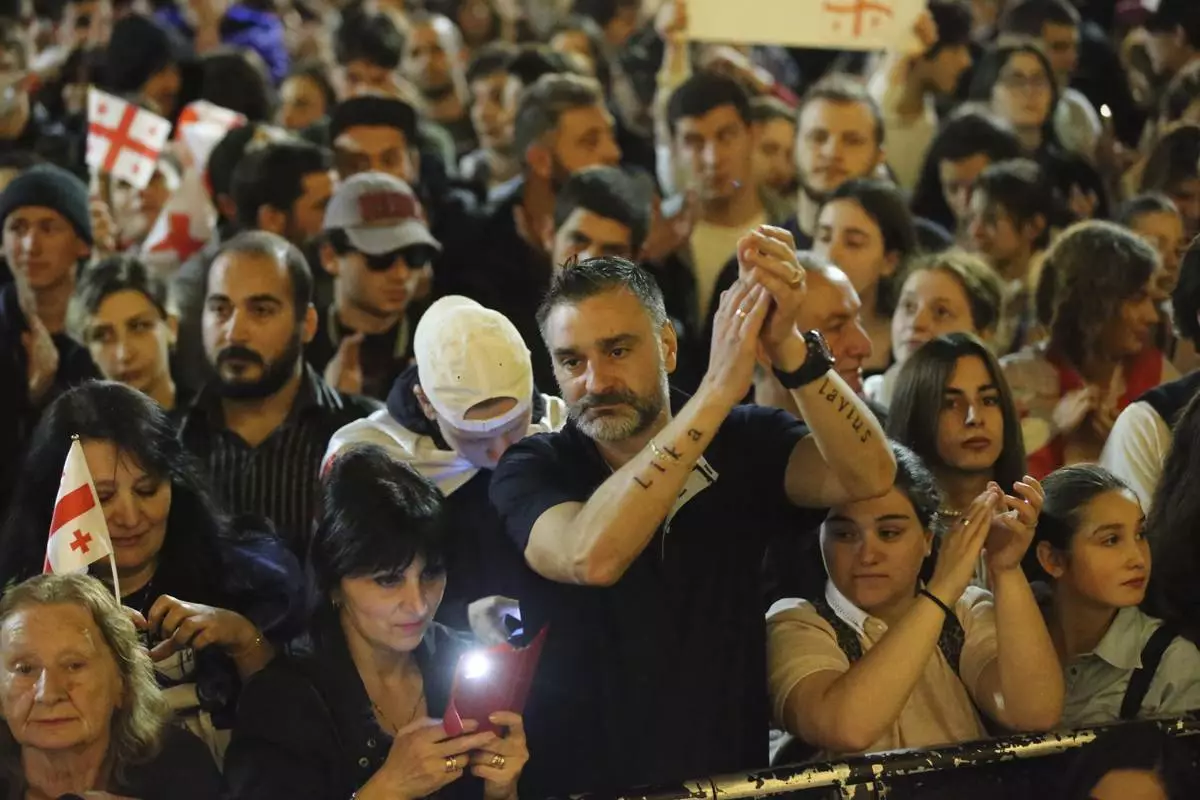
Demonstrators gather outside the parliament building in Tbilisi, Georgia, on Wednesday, April 17, 2024, to protest against "the Russian law" similar to a law that Russia uses to stigmatize independent news media and organizations seen as being at odds with the Kremlin. (AP Photo/Zurab Tsertsvadze)
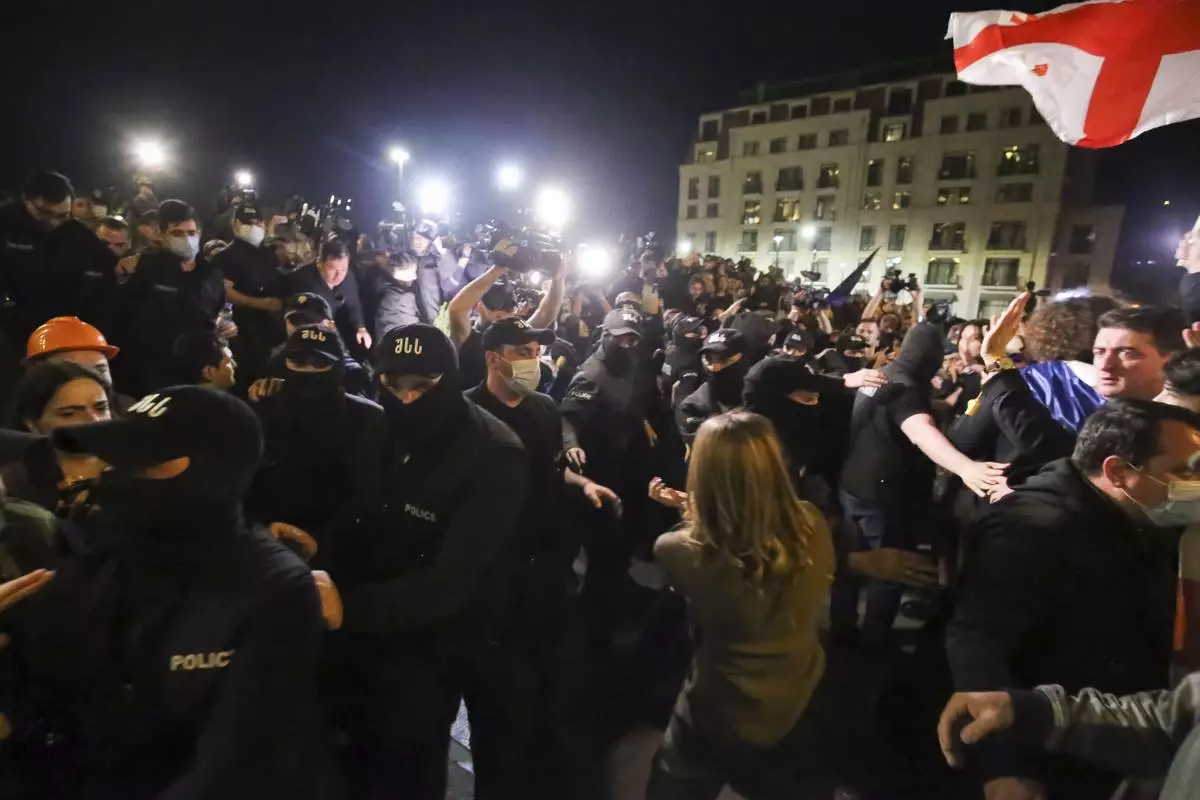
Police try to block demonstrators gathered outside the parliament building in Tbilisi, Georgia, on Thursday, April 18, 2024, to protest against "the Russian law" similar to a law that Russia uses to stigmatize independent news media and organizations seen as being at odds with the Kremlin. (AP Photo/Zurab Tsertsvadze)
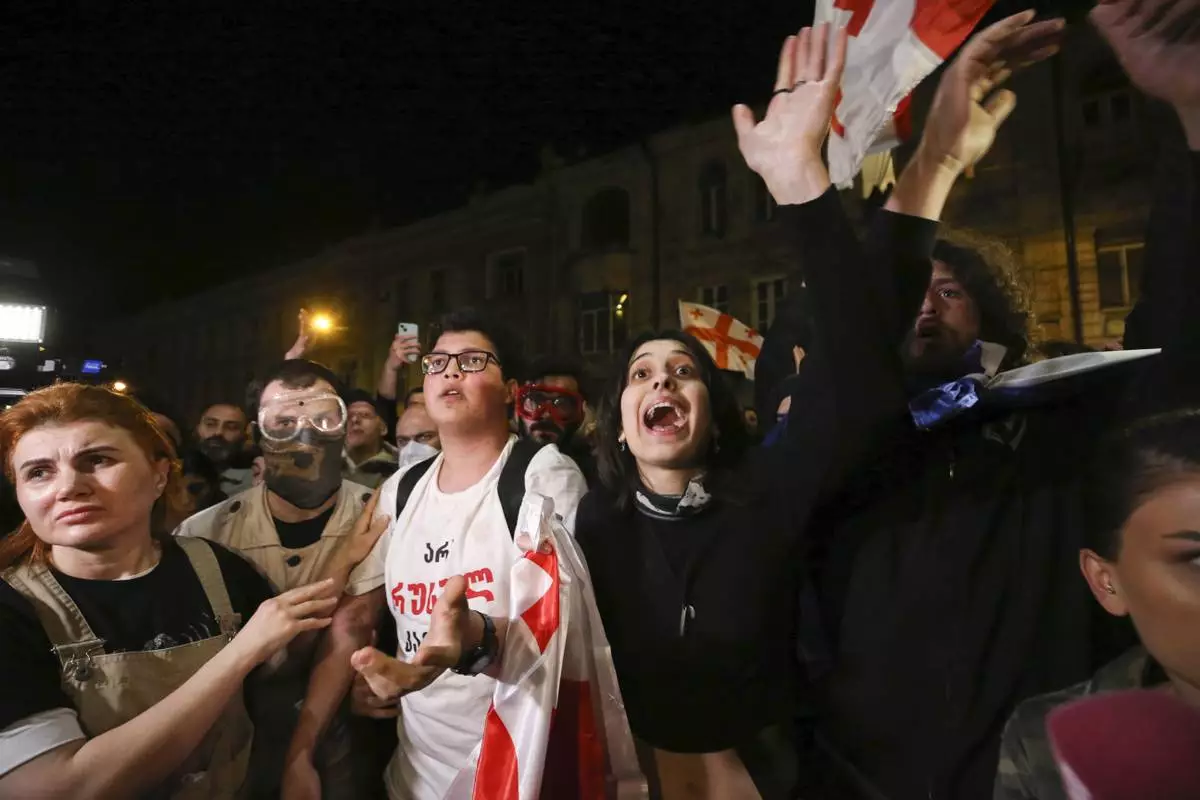
Demonstrator shouts during a rally outside the parliament building in Tbilisi, Georgia, on Thursday, April 18, 2024, to protest against "the Russian law" similar to a law that Russia uses to stigmatize independent news media and organizations seen as being at odds with the Kremlin. (AP Photo/Zurab Tsertsvadze)

A demonstrator gestures as he shouts during a rally outside the parliament building in Tbilisi, Georgia, on Thursday, April 18, 2024, to protest against "the Russian law" similar to a law that Russia uses to stigmatize independent news media and organizations seen as being at odds with the Kremlin. (AP Photo/Zurab Tsertsvadze)
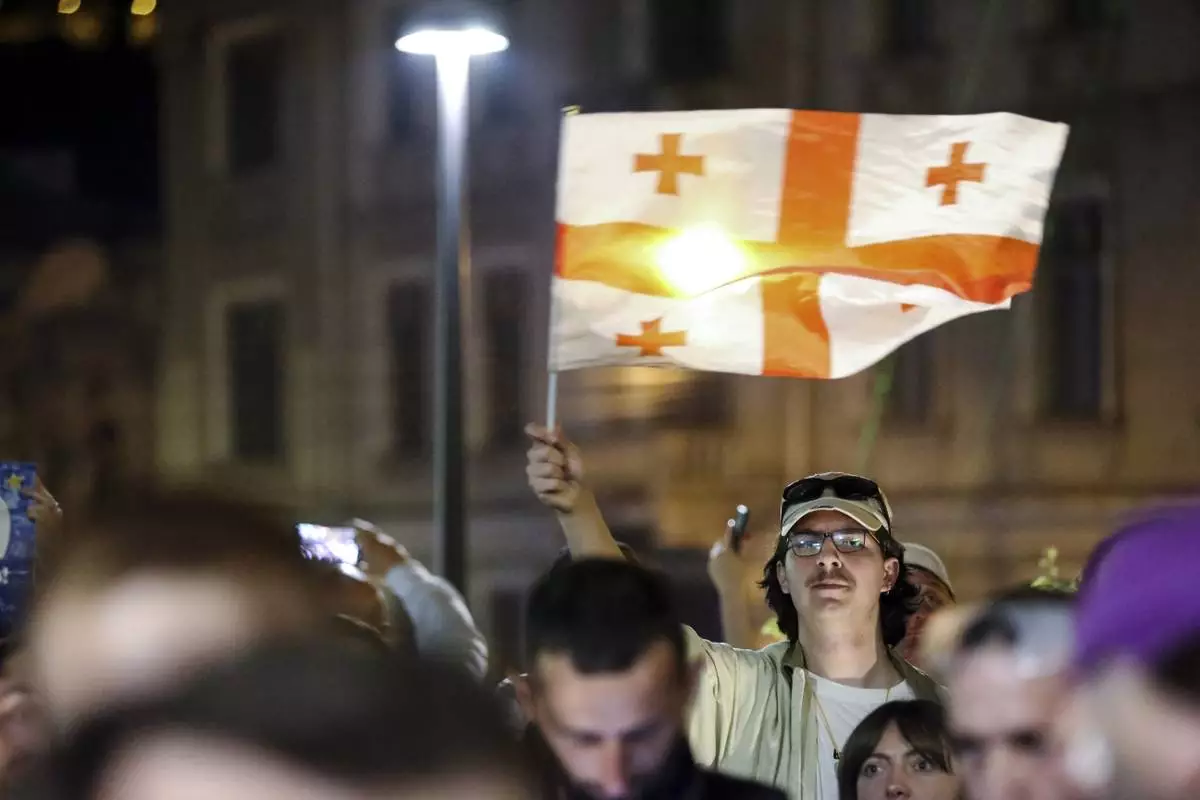
A demonstrator holds a Georgian national flag during a rally outside the parliament building in Tbilisi, Georgia, on Wednesday, April 17, 2024, to protest against "the Russian law" similar to a law that Russia uses to stigmatize independent news media and organizations seen as being at odds with the Kremlin. (AP Photo/Zurab Tsertsvadze)
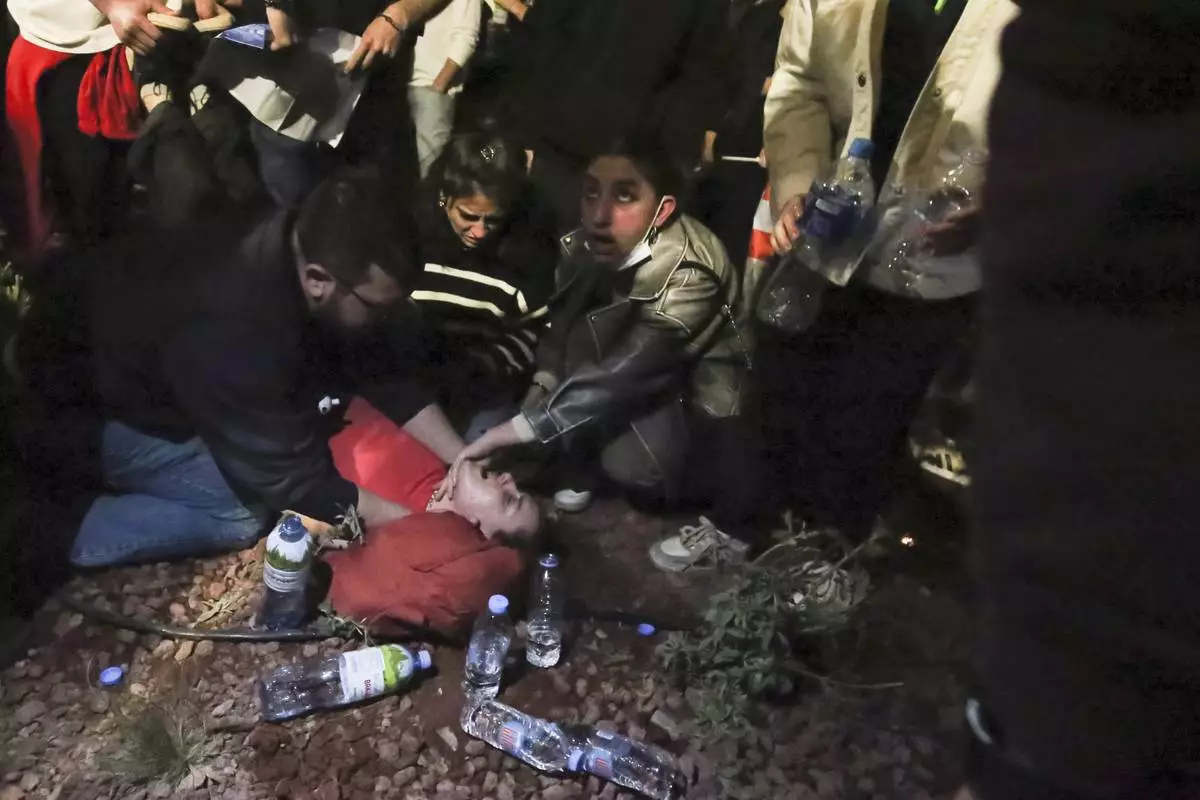
People help an unconscious demonstrator during a rally outside the parliament building in Tbilisi, Georgia, on Thursday, April 18, 2024, to protest against "the Russian law" similar to a law that Russia uses to stigmatize independent news media and organizations seen as being at odds with the Kremlin. (AP Photo/Zurab Tsertsvadze)
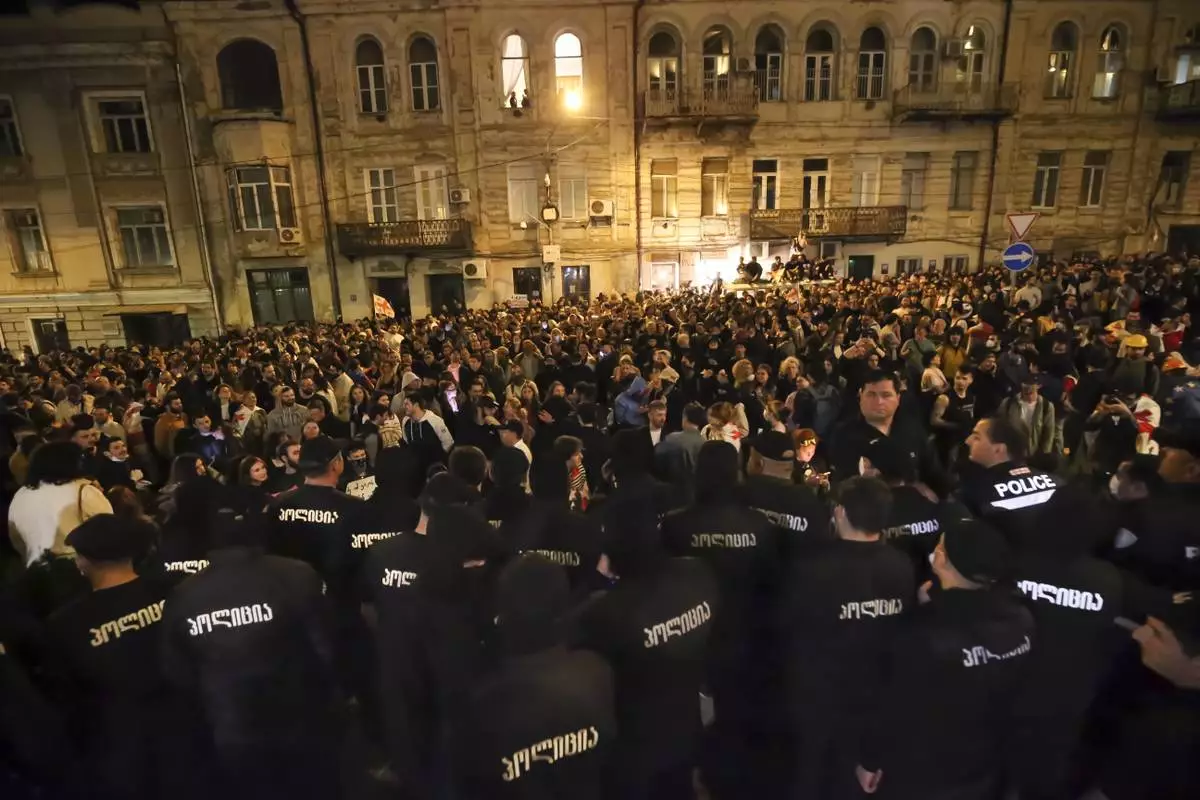
Police try to block demonstrators gathered outside the parliament building in Tbilisi, Georgia, on Wednesday, April 17, 2024, to protest against "the Russian law" similar to a law that Russia uses to stigmatize independent news media and organizations seen as being at odds with the Kremlin. (AP Photo/Zurab Tsertsvadze)
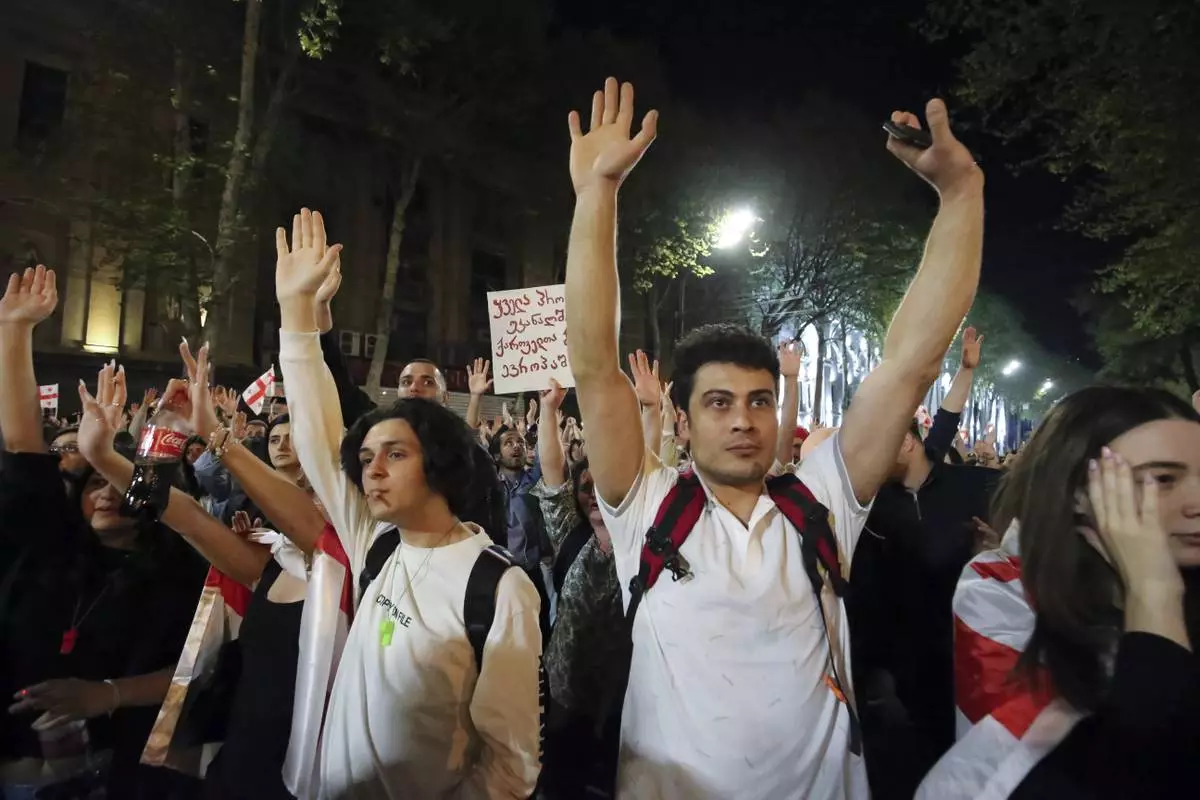
Demonstrators react listening to a speaker as they gather outside the parliament building in Tbilisi, Georgia, on Wednesday, April 17, 2024, to protest against "the Russian law" similar to a law that Russia uses to stigmatize independent news media and organizations seen as being at odds with the Kremlin. (AP Photo/Zurab Tsertsvadze)
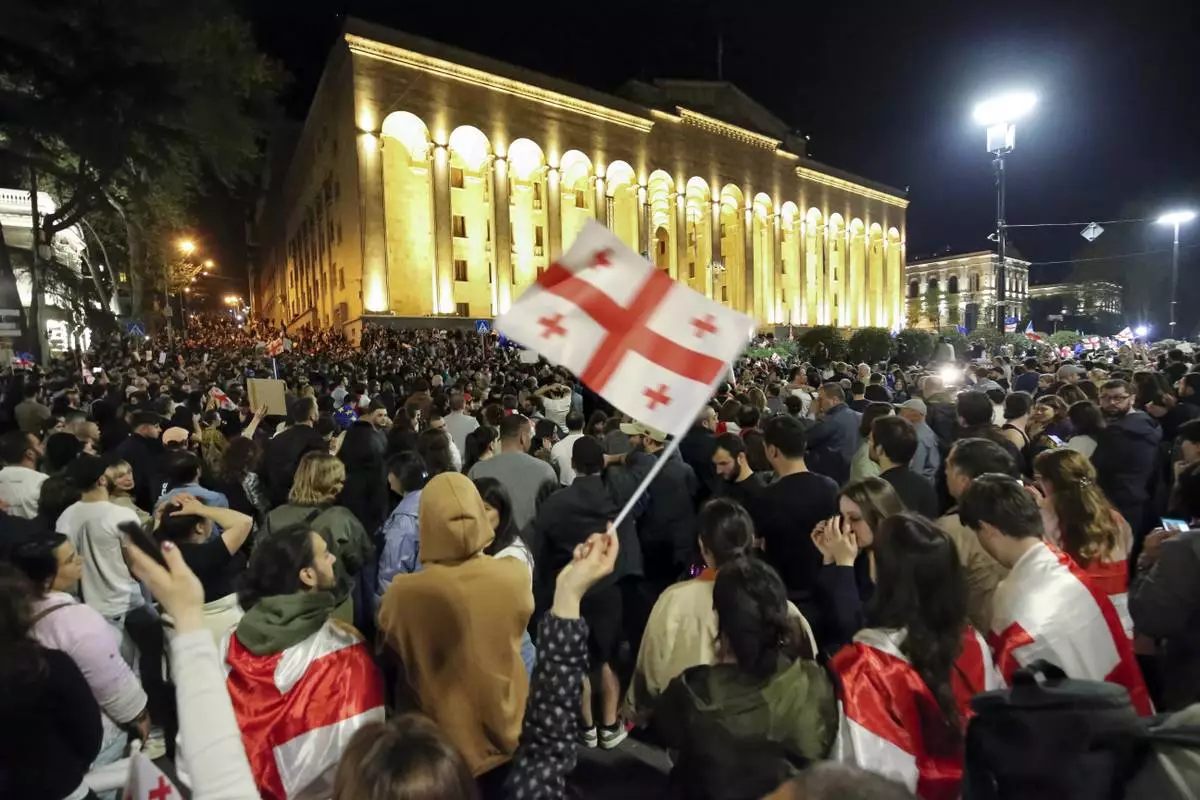
Demonstrators wave a Georgian national flag as they gather outside the parliament building in Tbilisi, Georgia, on Wednesday, April 17, 2024, to protest against "the Russian law" similar to a law that Russia uses to stigmatize independent news media and organizations seen as being at odds with the Kremlin. (AP Photo/Zurab Tsertsvadze)
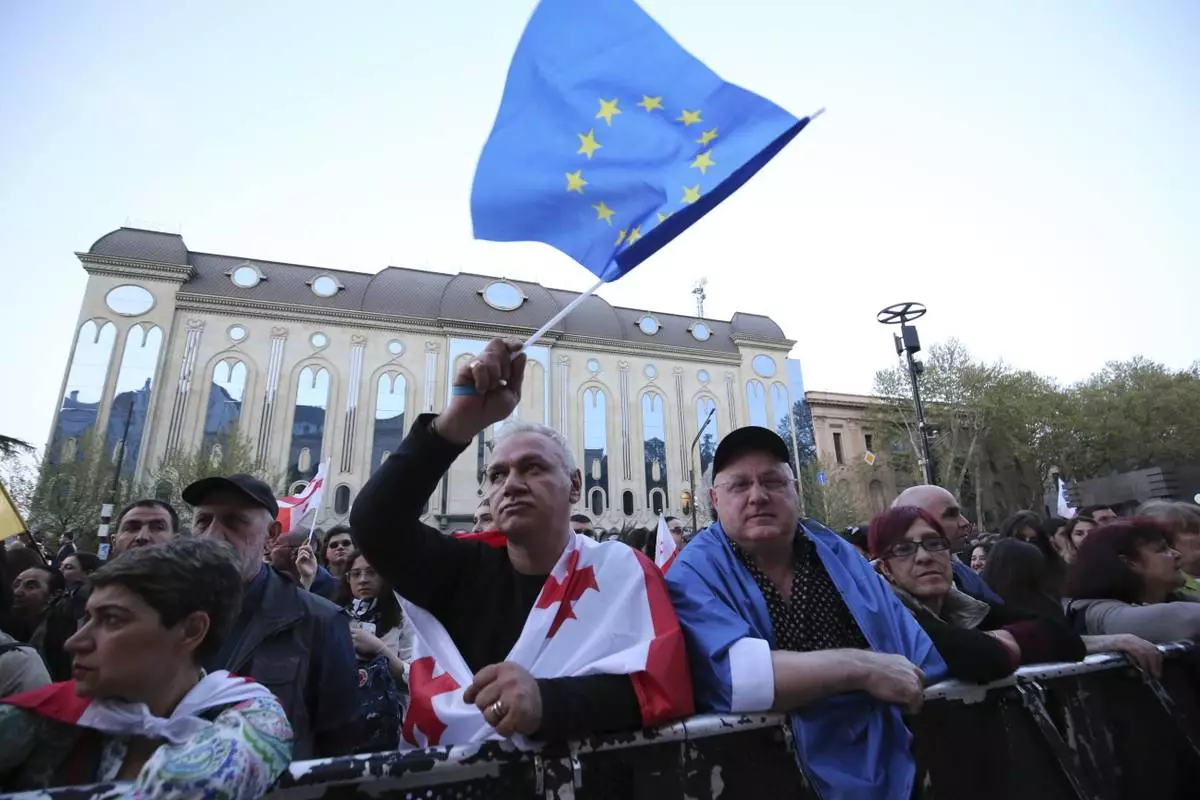
Demonstrators, one of them waves a EU flag, gather outside the parliament building in Tbilisi, Georgia, on Wednesday, April 17, 2024, to protest against "the Russian law" similar to a law that Russia uses to stigmatize independent news media and organizations seen as being at odds with the Kremlin. (AP Photo/Zurab Tsertsvadze)
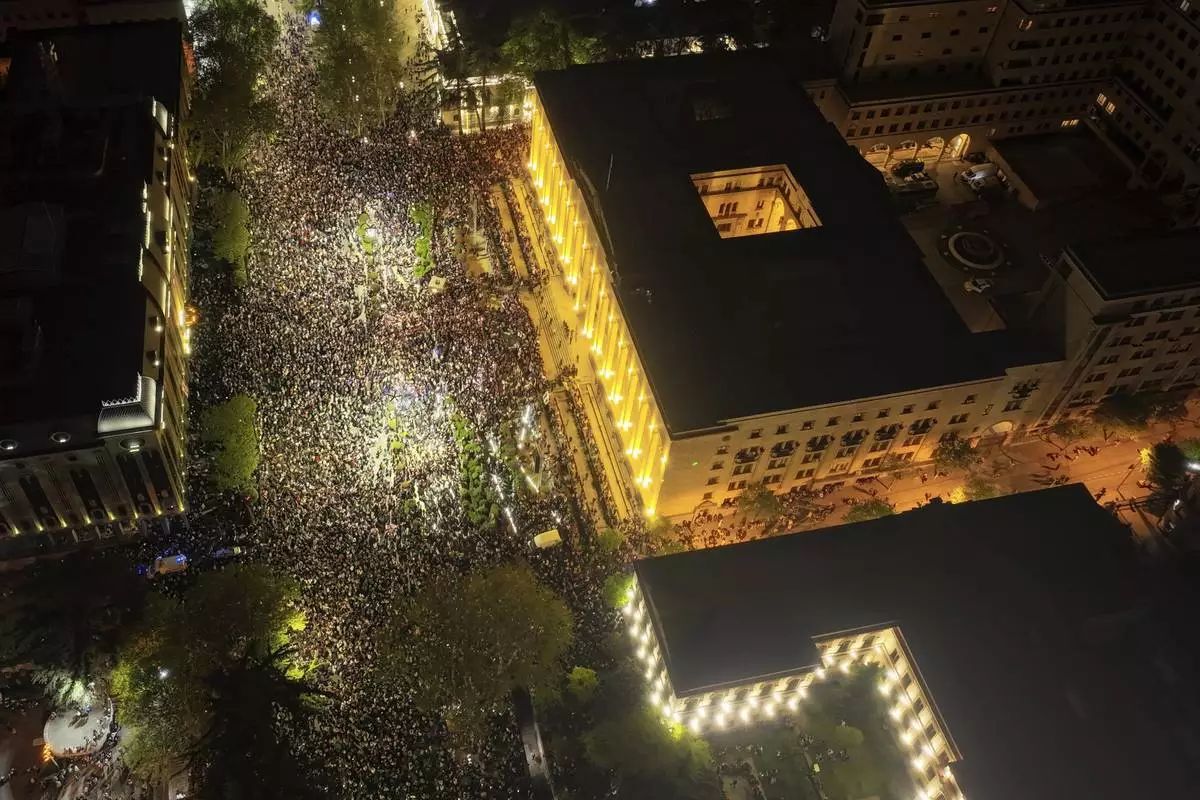
Demonstrators wave Georgian and EU flags as they gather outside the parliament building in Tbilisi, Georgia, on Wednesday, April 17, 2024, to protest against "the Russian law" similar to a law that Russia uses to stigmatize independent news media and organizations seen as being at odds with the Kremlin. (AP Photo/Zurab Tsertsvadze)
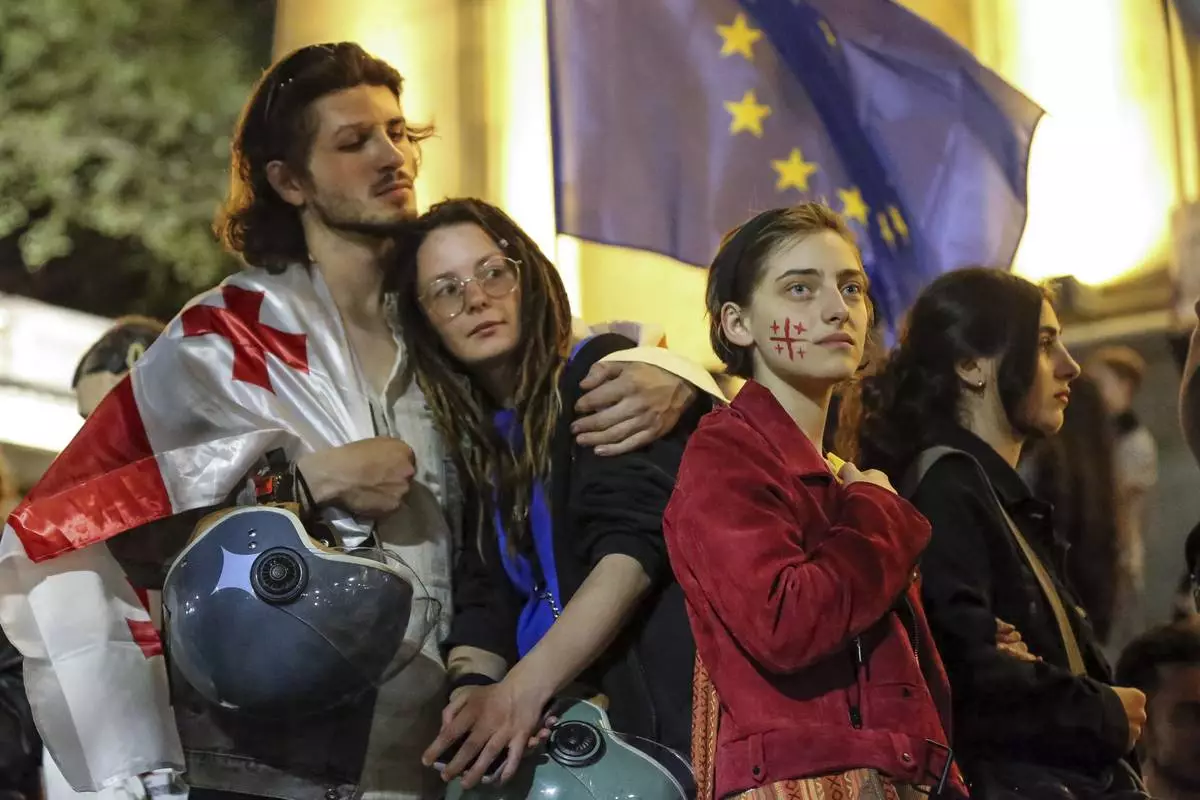
Demonstrators attend a rally outside the parliament building in Tbilisi, Georgia, on Wednesday, April 17, 2024, to protest against "the Russian law" similar to a law that Russia uses to stigmatize independent news media and organizations seen as being at odds with the Kremlin. (AP Photo/Zurab Tsertsvadze)
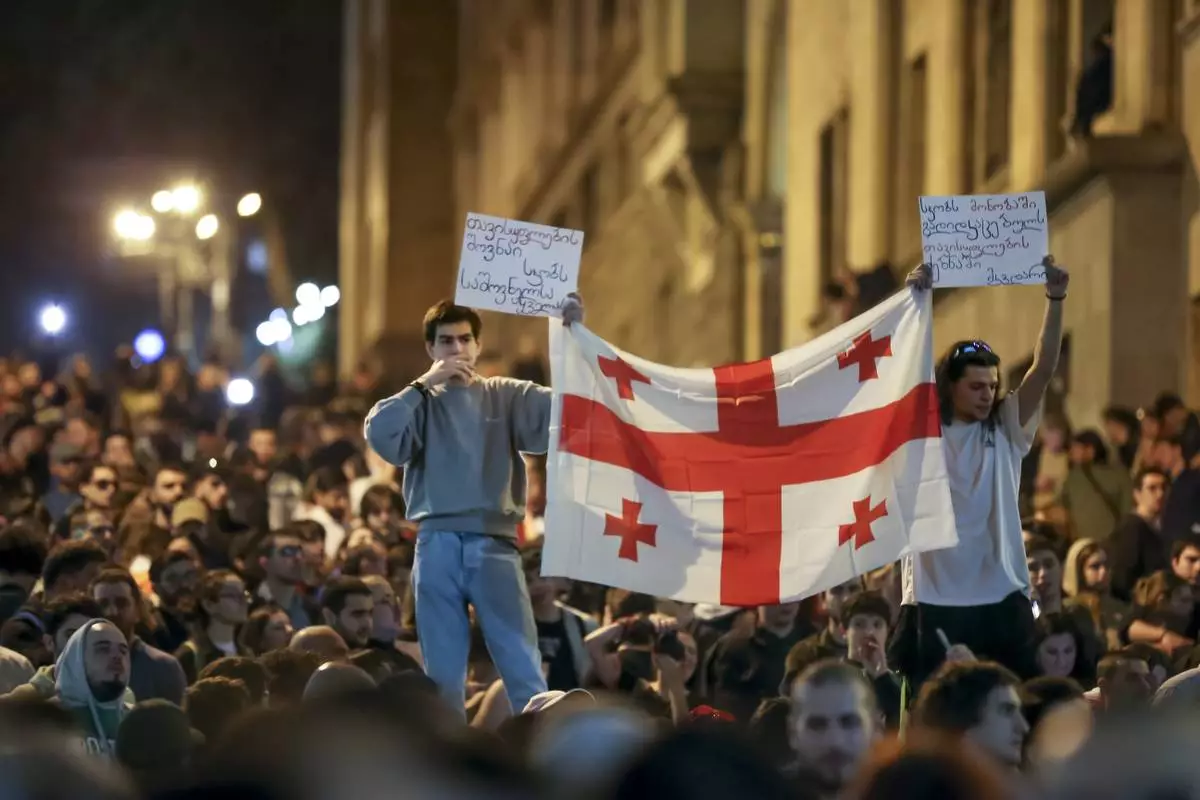
Demonstrators hold a Georgian national flag as they gather outside the parliament building in Tbilisi, Georgia, on Wednesday, April 17, 2024, to protest against "the Russian law" similar to a law that Russia uses to stigmatize independent news media and organizations seen as being at odds with the Kremlin. (AP Photo/Zurab Tsertsvadze)
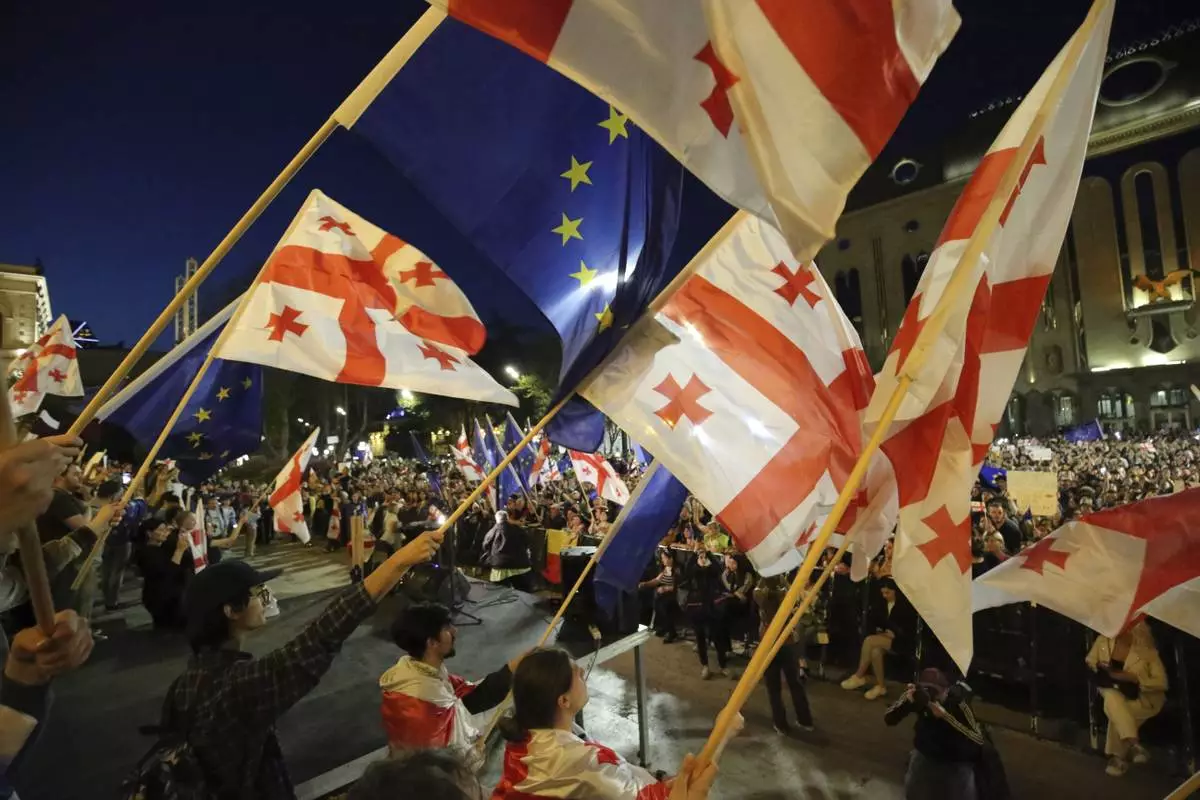
Demonstrators wave Georgian and EU flags as they gather outside the parliament building in Tbilisi, Georgia, on Wednesday, April 17, 2024, to protest against "the Russian law" similar to a law that Russia uses to stigmatize independent news media and organizations seen as being at odds with the Kremlin. (AP Photo/Zurab Tsertsvadze)
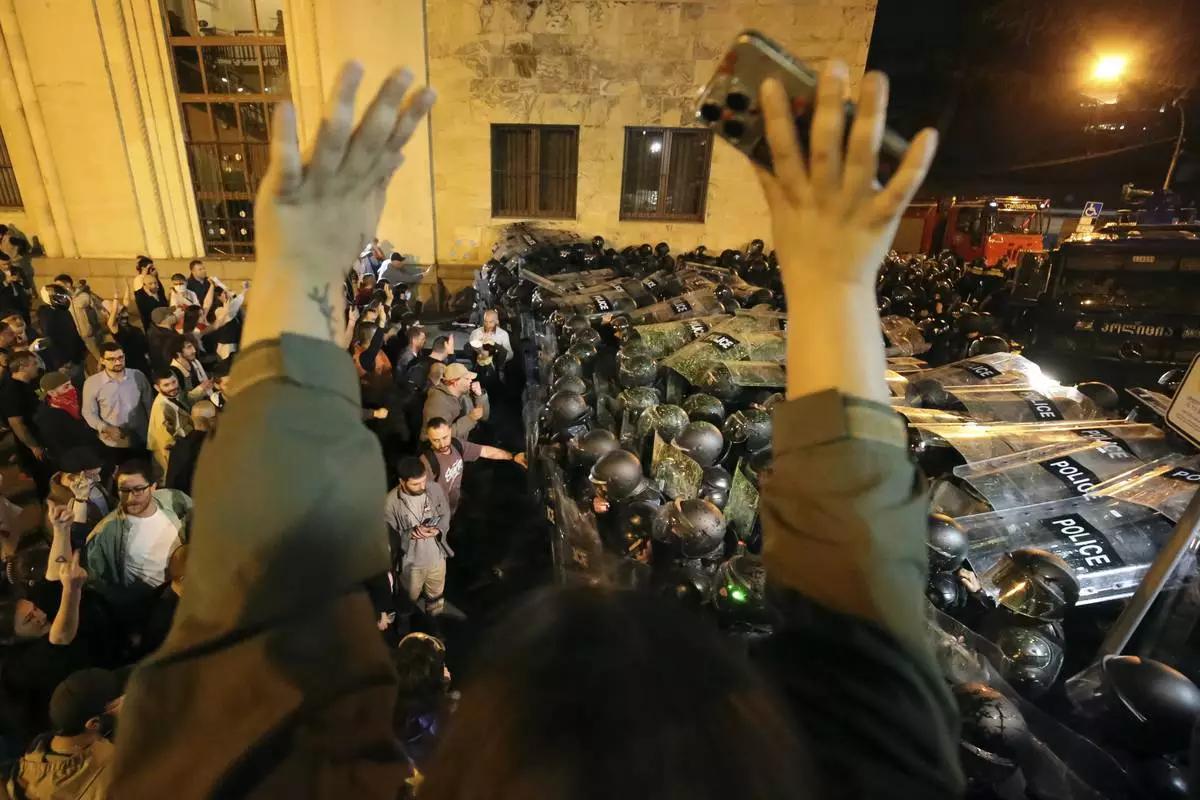
Police block protestors gathered outside the parliament building in Tbilisi, Georgia, on Tuesday, April 16, 2024, to protest against "the Russian law" similar to a law that Russia uses to stigmatize independent news media and organizations seen as being at odds with the Kremlin. (AP Photo/Zurab Tsertsvadze)
BEIJING (AP) — The first scientist to publish a sequence of the COVID-19 virus in China said he was allowed back into his lab after he spent days locked outside, sitting in protest.
Zhang Yongzhen wrote in an online post on Wednesday, just past midnight, that the medical center that hosts his lab had “tentatively agreed” to allow him and his team to return and continue their research for the time being.
“Now, team members can enter and leave the laboratory freely,” Zhang wrote in a post on Weibo, a Chinese social media platform. He added that he is negotiating a plan to relocate the lab in a way that doesn’t disrupt his team’s work with the Shanghai Public Health Clinical Center, which hosts Zhang’s lab.
Zhang and his team were suddenly told they had to leave their lab for renovations on Thursday, setting off the dispute, he said in an earlier post that was later deleted. On Sunday, Zhang began a sit-in protest outside his lab after he found he was locked out, a sign of continuing pressure on Chinese scientists conducting research on the coronavirus.
Zhang sat outside on flattened cardboard in drizzling rain, and members of his team unfurled a banner that read “Resume normal scientific research work," pictures posted online show. News of the protest spread widely on Chinese social media, putting pressure on local authorities.
In an online statement Monday, the Shanghai Public Health Clinical Center said that Zhang’s lab was closed for “safety reasons” while being renovated. It added that it had provided Zhang’s team an alternative laboratory space.
But Zhang responded the same day his team wasn’t offered an alternative until after they were notified of their eviction, and the lab offered didn’t meet safety standards for conducting their research, leaving his team in limbo.
Zhang’s dispute with his host institution was the latest in a series of setbacks, demotions and ousters since the virologist published the sequence in January 2020 without state approval.
Beijing has sought to control information related to the virus since it first emerged. An Associated Press investigation found that the government froze domestic and international efforts to trace it from the first weeks of the outbreak. These days, labs are closed, collaborations shattered, foreign scientists forced out and some Chinese researchers barred from leaving the country.
Zhang’s ordeal started when he and his team decoded the virus on Jan. 5, 2020, and wrote an internal notice warning Chinese authorities of its potential to spread — but did not make the sequence public. The next day, Zhang’s lab was ordered to close temporarily by China’s top health official, and Zhang came under pressure from the authorities.
Foreign scientists soon learned that Zhang and other Chinese scientists had deciphered the virus and called on China to release the sequence. Zhang published it on Jan. 11, 2020, despite a lack of permission from Chinese health officials.
Sequencing a virus is key to the development of test kits, disease control measures and vaccinations. The virus eventually spread to every corner of the world, triggering a pandemic that disrupted lives and commerce, prompted widespread lockdowns and killed millions of people.
Zhang was awarded prizes overseas in recognition for his work. But health officials removed him from a post at the Chinese Center for Disease Control and Prevention and barred him from collaborating with some of his former partners, hindering his research.
Still, Zhang retains support from some in the government. Though some of Zhang’s online posts were deleted, his sit-in protest was reported widely in China’s state-controlled media, indicating divisions within the Chinese government on how to deal with Zhang and his team.
“Thank you to my online followers and people from all walks of life for your concern and strong support over the past few days!” Zhang wrote in his post Wednesday.
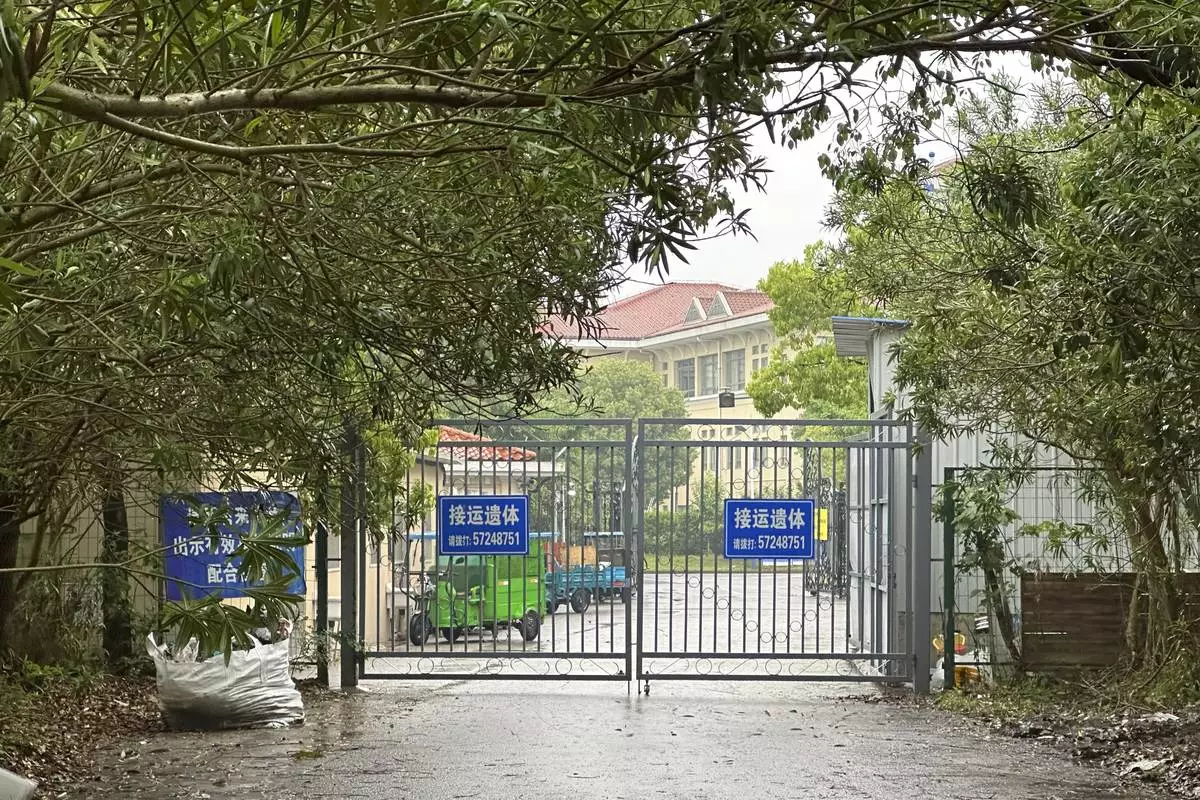
Buildings in the Shanghai Public Health Clinical Center stand near the entrance of the compound in Shanghai, China, Tuesday, April 30, 2024. Zhang Yongzhen, the first scientist to publish a sequence of the COVID-19 virus, staged a sit-in protest after authorities locked him out of his lab at the center. (AP Photo/Dake Kang)
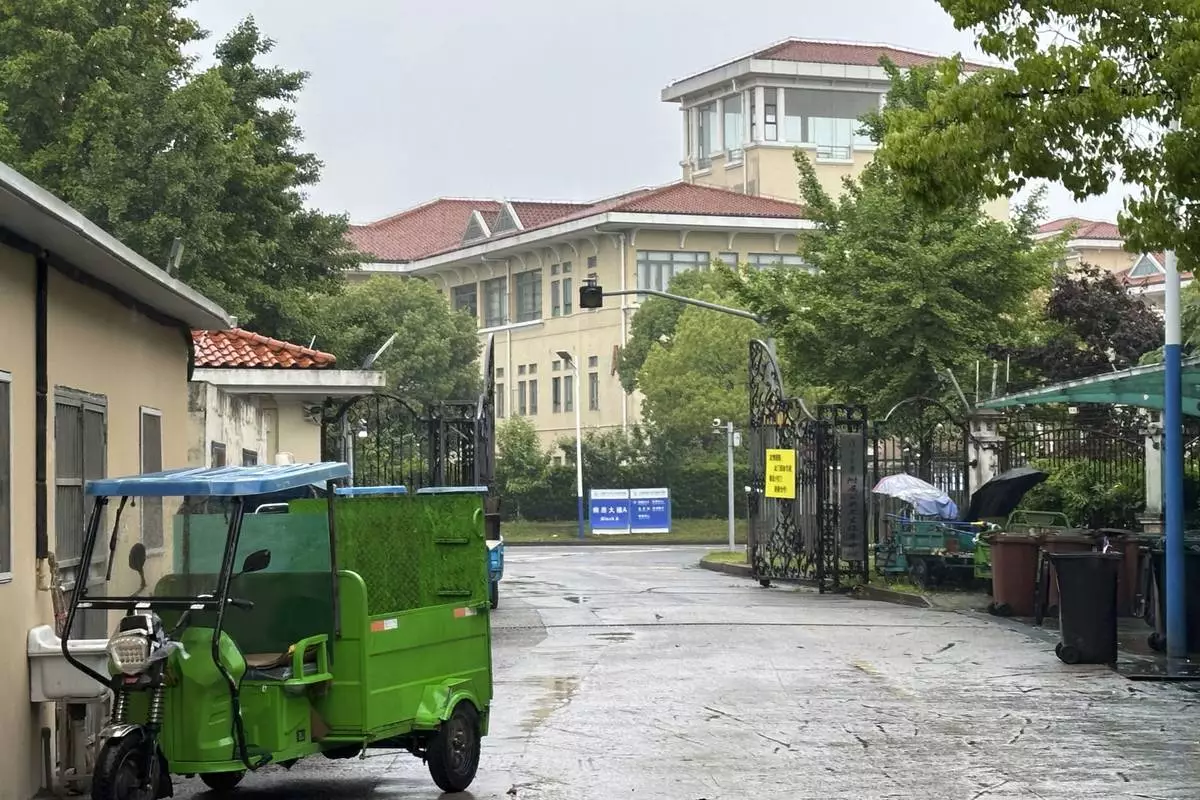
Buildings in the Shanghai Public Health Clinical Center stand near the entrance of the compound in Shanghai, China Tuesday, April 30, 2024. Zhang Yongzhen, the first scientist to publish a sequence of the COVID-19 virus, staged a sit-in protest after authorities locked him out of his lab at the center. (AP Photo/Dake Kang)
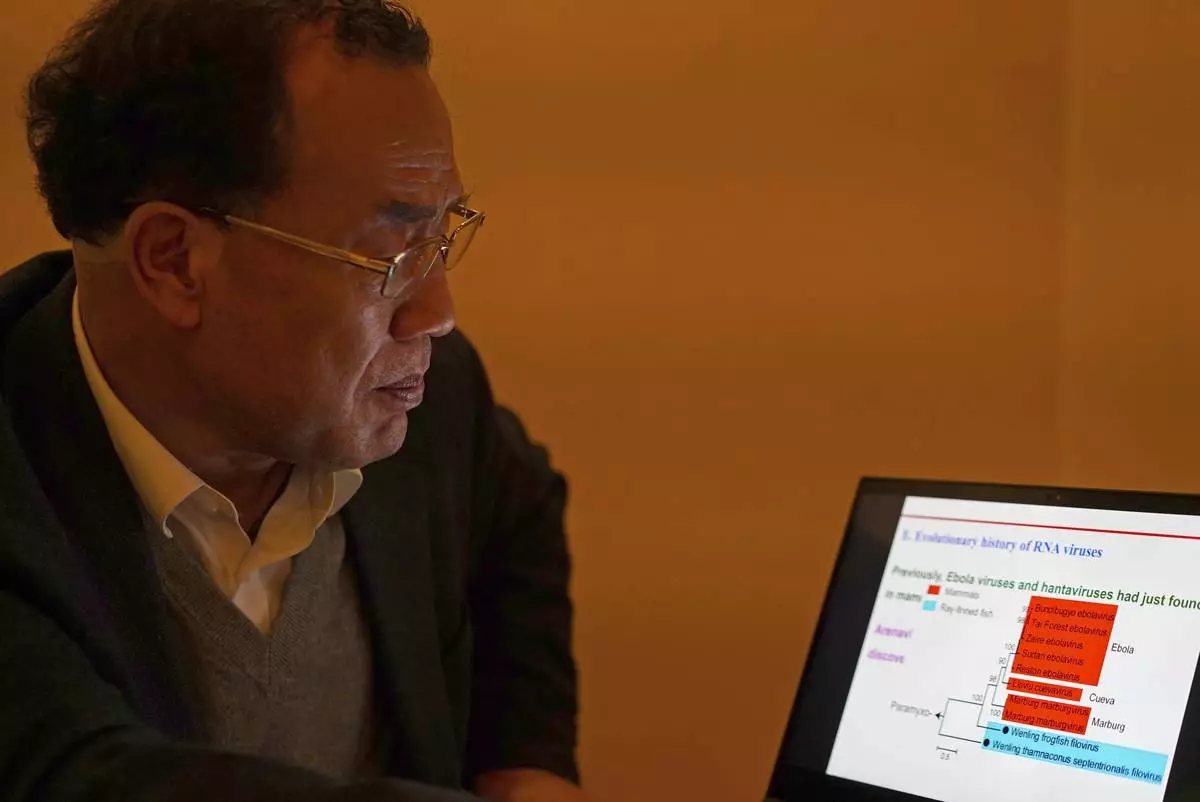
Zhang Yongzhen, the first scientist to publish a sequence of the COVID-19 virus, looks at a presentation on his laptop in a coffeeshop in Shanghai, China on Dec. 13, 2020. Zhang was staging a sit-in protest after authorities locked him out of his lab. Zhang wrote in an online post on Monday, April 29, 2024, that he and his team were suddenly notified they were being evicted from their lab, the latest in a series of setbacks, demotions and ousters since he first published the sequence in early January 2020.(AP Photo/Dake Kang)
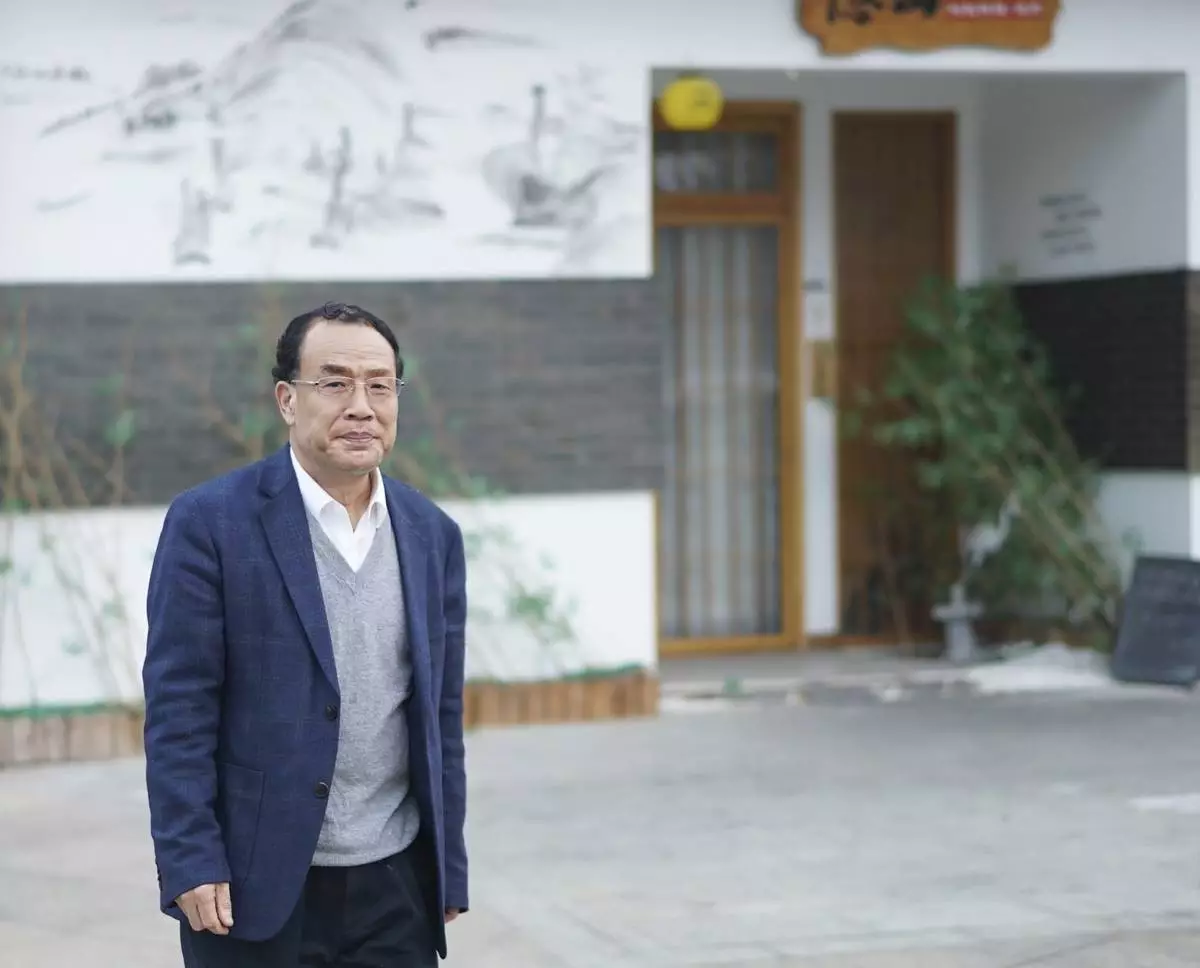
Virologist Zhang Yongzhen, the first scientist to publish a sequence of the COVID-19 virus, walks down a street in Shanghai, China on Dec. 13, 2020. Zhang was staging a sit-in protest after authorities locked him out of his lab. Zhang wrote in an online post on Monday, April 29, 2024, that he and his team were suddenly notified they were being evicted from their lab, the latest in a series of setbacks, demotions and ousters since he first published the sequence in early January 2020.(AP Photo/Dake Kang)























